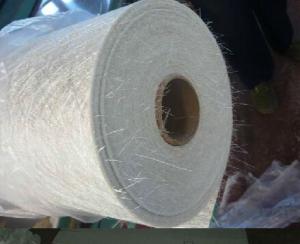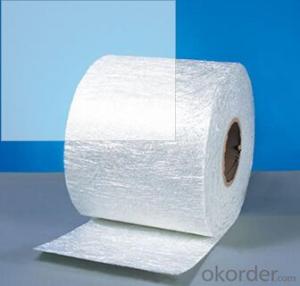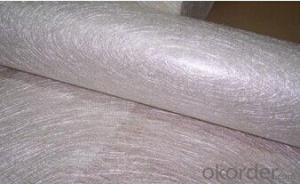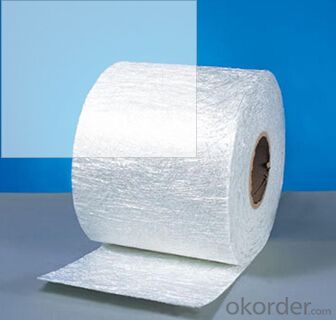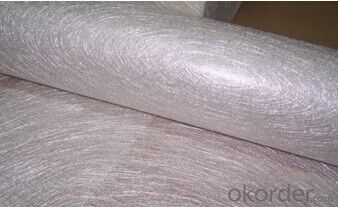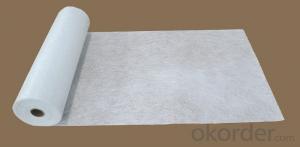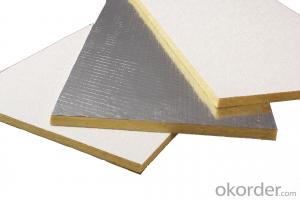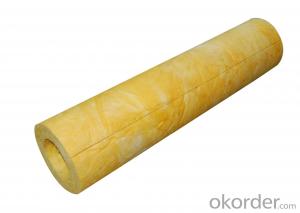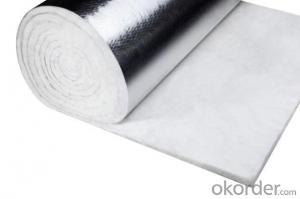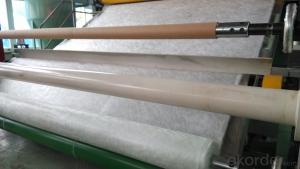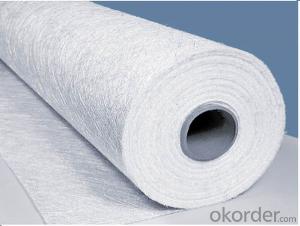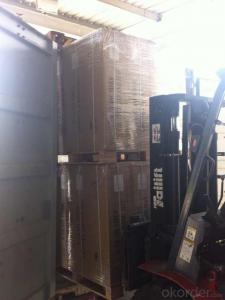Fiberglass Mat Tissue C-Glass Chopped Strand Mat-Emulsion
- Loading Port:
- China Main Port
- Payment Terms:
- TT or LC
- Min Order Qty:
- -
- Supply Capability:
- -
OKorder Service Pledge
OKorder Financial Service
You Might Also Like
Introduction of E-glass Chopped Strand Mat
Chopped strand mat is made from fiberglass chopped strands boned with powder binder or emulsion binder.
E glass chopped strand mat is made from fiberglass strands chopped to length and bonded together
with powder binder. Chopped strand mat is used primarily for hand lay-up processes, filament winding and press molding of FRP products. Typical products include bathroom
E glass chopped strand mat is made from fiberglass strands chopped to length and bonded together
with powder binder. Chopped strand mat is used primarily for hand lay-up processes, filament winding and press molding of FRP products. Typical products include bathroom
accessories, pipe, building materials, automobiles, furniture and other FRP products.
Features of E-glass Chopped Strand Mat
1.Warp and weft rovings aligned in a parallel,flat manner and uniform tension .
2.Densely alighed fibers,providing high dimensional stability ans easy handing .
3.Good moldability,fast and complete resin wet-out ,enabling high productively .
4.Good transporsision and hign strength of the composite products.
5.Even thickness ,no fuzz ,no stain.
6.Fast wet-out ,products with high strength ,little loss for strength in damp situation.
7.fiberglass woven roving has the features of : high tensile strength, corrosion resistance, flame retardance,insulativity.main function
8.applied to hand lay-up process
9.to reinforce UP resin
10.even thickness and flawless
11.good performance of processability in moulded parts
12.properties guaranteed under moisture condition
13.excellent mechanical strength during production of finished products
Features of E-glass Chopped Strand Mat
1.the composit products have high dry and wet tensile strenth and good transparency.
2.Low fuzz ,dirt ,impurity and other stain
Images of E-glass Chopped Strand Mat
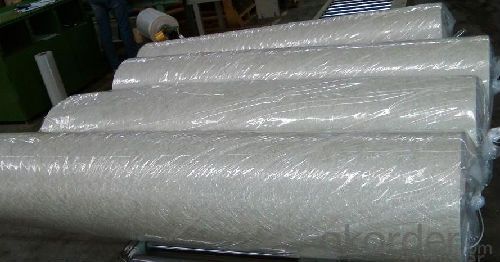
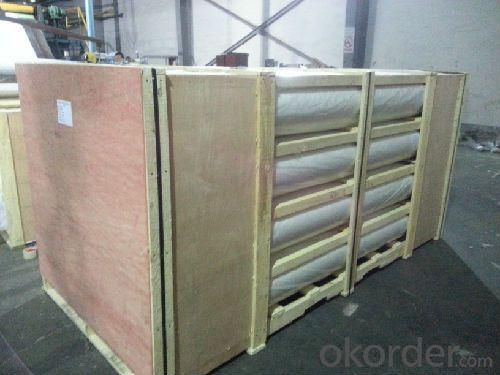
E-Glass Chopped Strand Mat Specification:
Property | Glass type | Weight(g/m2) | Width 200~3300 | Roll Weight | Moisture Content /% | Combustible Content /% | Breakage Strength /N |
Test Method | GB/T 1549 | ISO3374:2000 | ISO3374 | GB/T17470-1998 | ISO3344:1997 | ISO1887:1995 | ISO3342 |
EMC 80 | E-GLASS | 80±16 | ±5 | 6~50 | <0.2 | 13.6±0.35 | ≥200 |
EMC 100 | E-GLASS | 100±10 | ±5 | 6~65 | <0.2 | 9.5±0.35 | ≥170 |
EMC 150 | E-GLASS | 150±15 | ±5 | 6~97 | <0.2 | 8.0±0.35 | ≥40 |
EMC 225 | E-GLASS | 225±22 | ±5 | 6~150 | <0.2 | 5.0±0.6 | ≥60 |
EMC 300 | E-GLASS | 300±30 | ±5 | 6~180 | <0.2 | 4.0±0.6 | ≥90 |
EMC 450 | E-GLASS | 450±45 | ±5 | 6~180 | <0.2 | 3.8±0.6 | ≥120 |
EMC 600 | E-GLASS | 600±60 | ±5 | 6~240 | <0.2 | 3.6±0.6 | ≥150 |
EMC 900 | E-GLASS | 900±90 | ±5 | 6~190 | <0.2 | 3.4±0.6 | ≥180 |
FAQ of Chopped strand mat
1. Why Choose us?
CNBM is a stated own company, provide the guarantee for the best quality, best service and safety business.
2. How will we guarantee the quality?
a, ISO 9001-2008 quality control system;
b, Strict and regular quality control in production;
c, Inspeciation when loading into container before shippment;
d, Sample stock for one year for quality tracing and record.
3. What is your MOQ?
Our MOQ is one pallet.
4. Can you provide sample?
Yes, samples are in stock. we can offer free sample for you.
5. Payment terms?
We can accept L/C, T/T etc.
6. Do you offer OEM service?
Yes, we can print customers’ logo on the packaging;
And the size and specification can be produced and design according to your demand.
7. What is the Production Lead Time?
1 *40HQ each day.
- Q: How does fiberglass mat tissue compare to other insulation materials?
- Fiberglass mat tissue offers several advantages over other insulation materials. Firstly, it has excellent thermal insulation properties, effectively reducing heat transfer and maintaining indoor temperature. Secondly, it is lightweight and easy to install, making it a cost-effective option. Additionally, fiberglass mat tissue has good sound absorption properties, making it ideal for reducing noise pollution. It is also resistant to fire, mold, and moisture, enhancing its durability and longevity. Overall, fiberglass mat tissue is a versatile and efficient insulation material that outperforms many alternatives in various aspects.
- Q: Is fiberglass mat tissue suitable for aerospace interiors?
- Yes, fiberglass mat tissue is suitable for aerospace interiors. Fiberglass mat tissue is a lightweight and highly versatile material that offers excellent strength and durability. It is commonly used in aerospace applications due to its ability to meet stringent fire safety requirements, such as low smoke and toxicity emissions. Additionally, fiberglass mat tissue is resistant to moisture, chemicals, and temperature variations, making it an ideal choice for the demanding conditions inside an aircraft cabin. Its excellent sound insulation properties further enhance its suitability for aerospace interiors, ensuring a comfortable and quiet environment for passengers. Overall, fiberglass mat tissue offers a reliable and efficient solution for aerospace interior applications.
- Q: How does fiberglass mat tissue perform in terms of thermal conductivity?
- Fiberglass mat tissue exhibits excellent thermal conductivity performance. Its fine glass fibers composition contributes to a low thermal conductivity value, resulting in effective heat transfer insulation. The interwoven fibers form a barrier that hinders heat movement, making it a highly suitable material for thermal insulation purposes. Moreover, the mat tissue is frequently combined with binders or coatings to enhance its thermal resistance characteristics. In summary, fiberglass mat tissue is a dependable option for reducing thermal conductivity and delivering insulation across diverse industries and applications.
- Q: Is fiberglass mat tissue suitable for insulation in chemical processing plants?
- Yes, fiberglass mat tissue is suitable for insulation in chemical processing plants. It is highly resistant to corrosion and chemicals, making it an ideal choice for such environments. Additionally, fiberglass mat tissue offers excellent thermal insulation properties, helping to maintain optimal temperature levels in the plant.
- Q: Can fiberglass mat tissue be used for insulation in commercial buildings?
- Insulation in commercial buildings can be achieved using fiberglass mat tissue. This material is commonly utilized due to its exceptional thermal performance, durability, and cost-effectiveness. Typically composed of fine glass fibers bonded with resin, the mat can be applied to various surfaces such as walls and ceilings to enhance energy efficiency by minimizing heat transfer. Proper insulation is vital in commercial buildings to maintain a comfortable indoor environment and reduce energy usage. Fiberglass mat tissue offers numerous benefits for insulation purposes. It possesses low thermal conductivity, effectively resisting heat flow and diminishing heat loss or gain through the building envelope. This results in lower energy expenses and improved temperature control. Furthermore, fiberglass mat tissue is lightweight and easy to install, making it a convenient option for commercial buildings. It can be easily cut and shaped to fit around obstacles, ensuring a secure seal and preventing air leakage. This further enhances the effectiveness of the insulation. Moreover, fiberglass mat tissue is non-combustible, providing an added safety advantage in commercial buildings where fire protection is paramount. It does not contribute to the spread of flames and its fire resistance properties assist in containing fires and offering valuable escape time during emergencies. Overall, fiberglass mat tissue is a suitable and widely utilized insulation material in commercial buildings. Its thermal performance, ease of installation, and fire resistance make it a dependable choice for achieving energy efficiency and comfort in commercial spaces.
- Q: How does the porosity of fiberglass mat tissue affect its performance?
- The performance of fiberglass mat tissue is significantly impacted by its porosity. Porosity refers to the presence of small pores or holes in the material, which affect its ability to absorb and retain fluids, as well as its strength and durability. To begin, the absorption capability of fiberglass mat tissue is influenced by its porosity. A higher porosity allows the tissue to absorb more fluids, such as resins or binders, during manufacturing. This absorption is crucial as it ensures better adhesion between the fiberglass mat and the bonding material, resulting in a stronger and more durable final product. Next, the strength and stiffness of the fiberglass mat tissue are affected by its porosity. A lower porosity generally indicates a higher density and a more tightly packed structure, resulting in increased strength and stiffness. This is beneficial in applications where the material needs to withstand high mechanical stresses or act as a structural component. Furthermore, the thermal and acoustic insulation properties of the fiberglass mat tissue are impacted by its porosity. A higher porosity typically leads to better thermal and acoustic insulation due to the increased number of air pockets within the material. These air pockets act as barriers, reducing heat transfer and sound transmission, making the material suitable for applications that require thermal or acoustic insulation. Moreover, the filtration capabilities of the fiberglass mat tissue can be influenced by its porosity. If the material has a high porosity, it can effectively trap and retain particles, making it suitable for use in filtration systems. Conversely, a low porosity may allow for better flow rates, making it more suitable for applications where fluid permeability is important, such as drainage applications. In conclusion, the porosity of fiberglass mat tissue has various effects on its performance. It determines its absorption capability, strength, stiffness, thermal and acoustic insulation properties, filtration capabilities, and fluid permeability. Therefore, understanding and controlling the porosity of fiberglass mat tissue is crucial to ensure optimal performance in a wide range of applications.
- Q: What is the weight range of fiberglass mat tissue?
- The weight range of fiberglass mat tissue can vary depending on the specific product and its intended application. Generally, fiberglass mat tissue can range in weight from around 20 grams per square meter (gsm) to 100 gsm or more. Thinner and lighter fiberglass mat tissues are often used for applications such as insulation or as a reinforcing layer in composite materials, while heavier fiberglass mat tissues are typically used for more demanding applications such as roofing or flooring. It is important to note that the weight range can also be influenced by factors such as the type of resin used, the desired strength or stiffness of the final product, and any specific requirements or specifications for a particular project.
- Q: What is the weathering resistance of fiberglass mat tissue?
- The weathering resistance of fiberglass mat tissue is generally high. It is designed to withstand exposure to various weather conditions, including sunlight, rain, and temperature fluctuations, without significant degradation or loss of performance.
- Q: Can fiberglass mat tissue be used for making insulation panels?
- Indeed, insulation panels can be manufactured using fiberglass mat tissue. This lightweight and flexible material possesses remarkable thermal insulation characteristics. Typically, it is utilized as a reinforcing layer during the production process of insulation panels. By doing so, the mat tissue not only fortifies the panels, but also ensures efficient insulation against heat transfer. Moreover, fiberglass mat tissue exhibits resistance against moisture, mold, and mildew, rendering it highly suitable for insulation purposes.
- Q: Can fiberglass mat tissue be used for insulation in cleanrooms?
- Yes, fiberglass mat tissue can be used for insulation in cleanrooms. It is a commonly used material due to its excellent thermal insulation properties, low cost, and high resistance to chemicals and moisture. Additionally, fiberglass mat tissue has low particulate emission, making it suitable for cleanroom environments where maintaining a controlled and sterile atmosphere is crucial.
Send your message to us
Fiberglass Mat Tissue C-Glass Chopped Strand Mat-Emulsion
- Loading Port:
- China Main Port
- Payment Terms:
- TT or LC
- Min Order Qty:
- -
- Supply Capability:
- -
OKorder Service Pledge
OKorder Financial Service
Similar products
Hot products
Hot Searches
Related keywords
